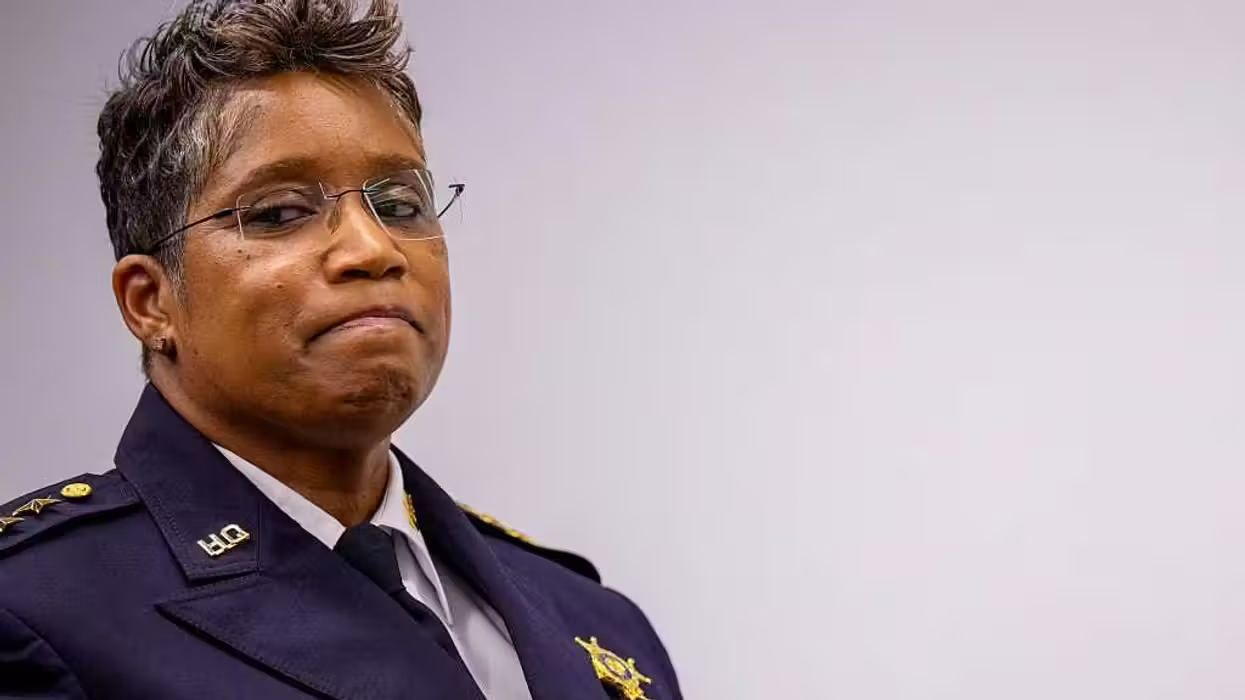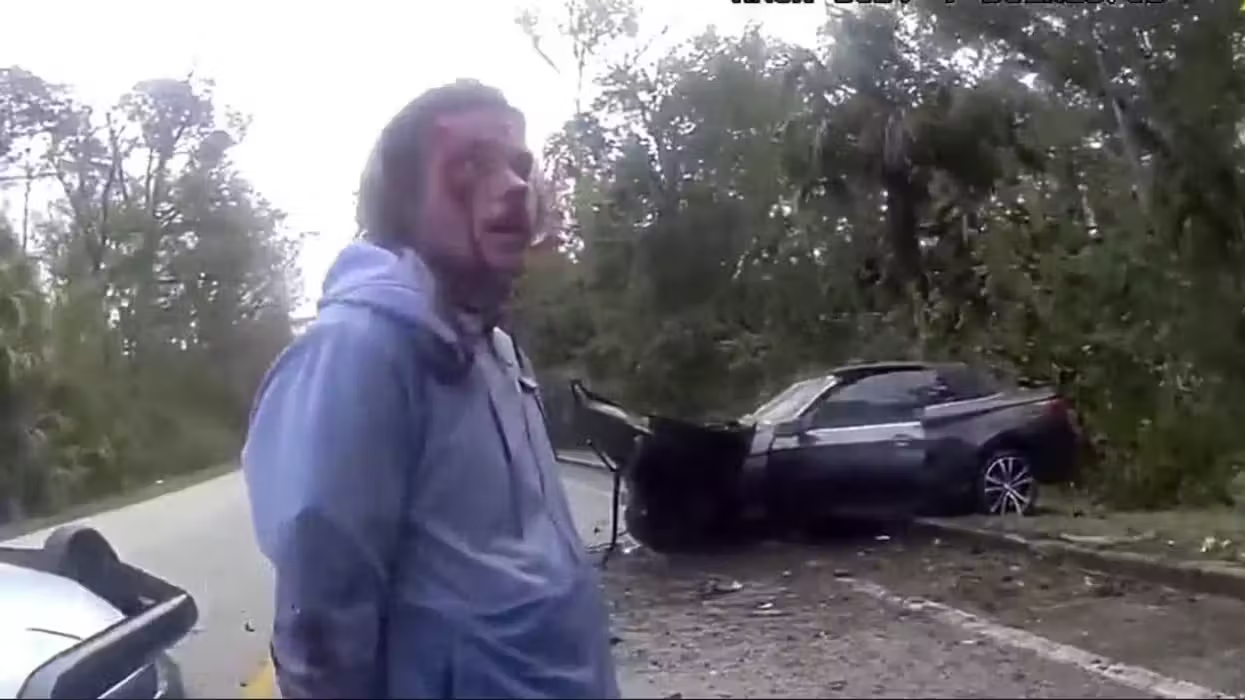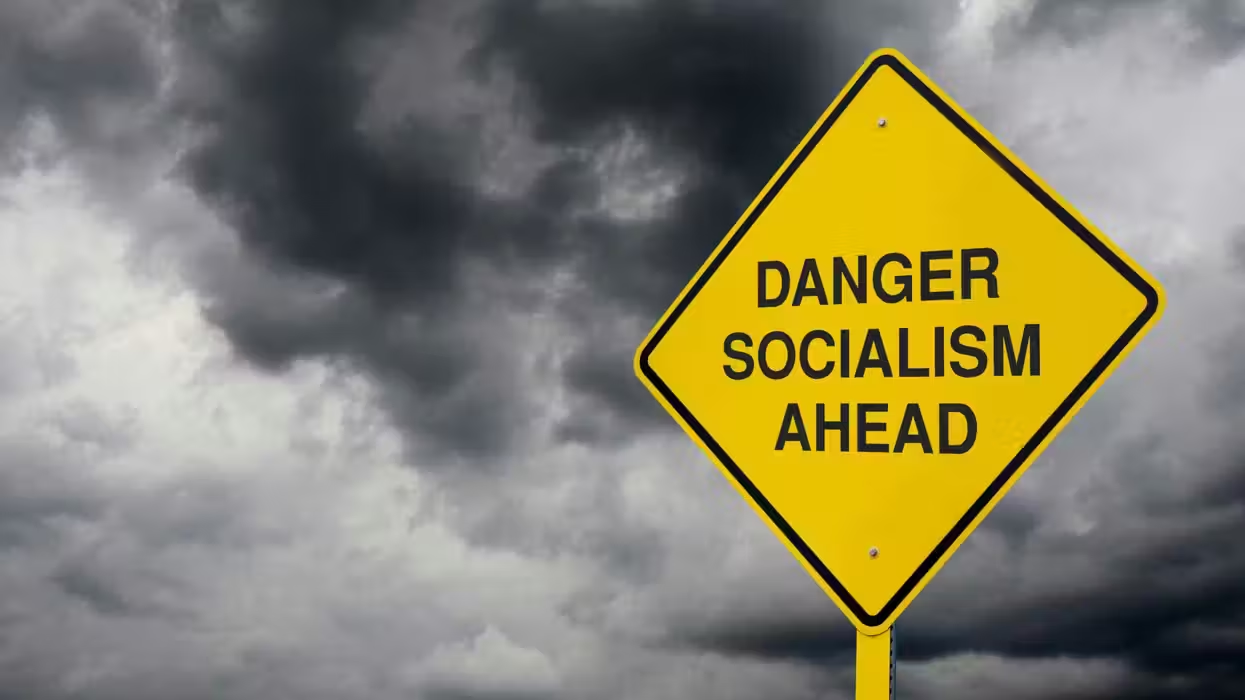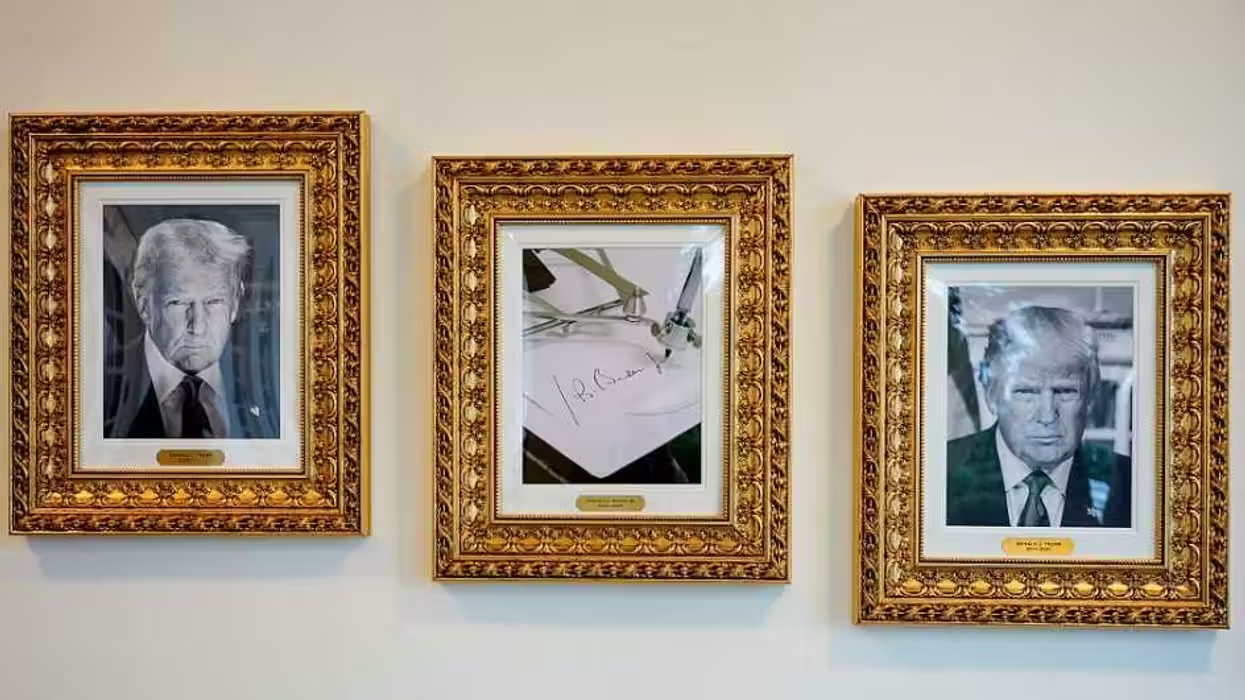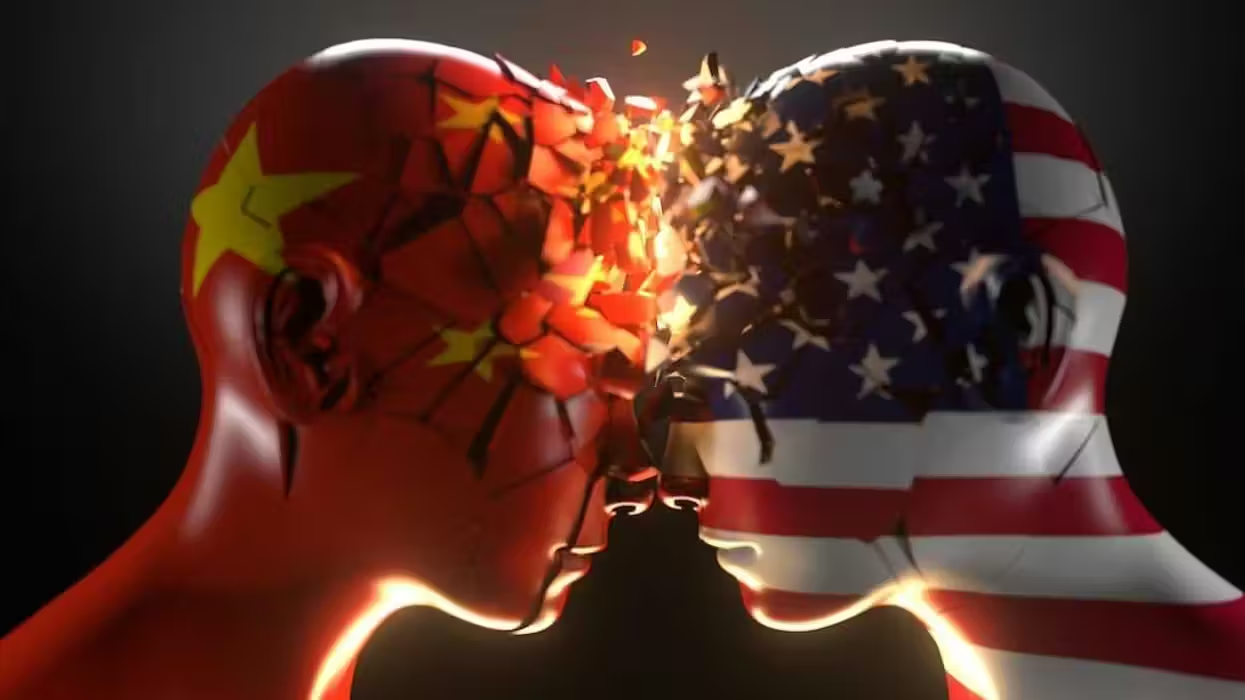
© 2025 Blaze Media LLC. All rights reserved.
The Blaze Exclusive Preview: 'Growing Up Patton: Reflections on Heroes, History and Family Wisdom
March 05, 2012

Benjamin Patton, the youngest grandson of legendary World War II General George S. Patton Jr., is releasing his first book Tuesday, "Growing Up Patton: Reflections on Heroes, History and Family Wisdom." The book examines the relationship between Ben and his father, Major General George Patton IV, as well as the relationship between Patton IV and his well-known father, General George S. Patton Jr.
General George S. Patton Jr. is regarded as one of the most successful United States field commanders of any war, and commanded campaigns in North Africa, Sicily and France during WWII. General Patton died in 1945 at the result of injuries suffered in a road accident in Germany when his son George Patton IV was 21 and a senior at West Point. Patton IV would go on to achieve the rank of Major General and served in three Vietnam tours. Major General Patton was wounded in Vietnam and awarded the Purple Heart, and twice awarded the Distinguished Service Cross, the second-highest decoration for bravery in combat.

Benjamin was born well after his grandfather's death, but references extensive correspondence between his father and grandfather, as well as interviews from friends and soldiers who served under both men to write a memoir about the relationships between father and son, as well as growing up in the Patton family.
Benjamin told The Blaze in a phone interview Monday that he was inspired to write the book and learn more about his father's life after Major General Patton's death in 2004.
"Like a lot of sons, there are conversations you want to have but never had the chance to," Benjamin said Monday. Researching for and writing the book gave Benjamin a chance to "circle back" to relationships between his father and grandfather, and some of the pivotal figures in the decorated lives of both men, including Creighton Abrams; the WWII hero who became his greatest mentor, Charley Watkins; a daredevil helicopter pilot in Vietnam, Manfred Rommel; the son of German Field Marshal Erwin Rommel popularly known as Desert Fox, Joanne Patton; the author's mother and resourceful fighter in her own right, and Benjamin's mentally challenged brother George.

"The book sheds some light on the misunderstandings of the relationship between my father and grandfather, and the challenges my father faced in living up to my grandfather's legacy,"Benjamin said. Benjamin tells The Blaze that the book illustrates how his father, like his grandfather, emphasized to his son that you need to have the right values. Benjamin said his father and grandfather would preach that praise simply from their family name was "unearned," but carried the responsibility to support our servicemen and women.
The book features never-before-published pictures and letters sent between General Patton and his son during WWII, including revealing correspondence written between 1939 and 1945 showing that Benjamin's grandfather espoused his ideals and values to Benjamin's father.

Benjamin tells The Blaze that military history buffs will enjoy the book, but it is really "about fathers and sons, reaching back in order to move forward." Benjamin explained to The Blaze that the book shows the deep connection his father and grandfather had to the men who served with them, especially those who never made it home. Benjamin said both men shared qualities of being able to use their persona and personality to lead in crisis, figuratively and literally, as he explained how his father enjoyed wearing white in the field unafraid of enemies identifying his position of leadership.
Despite the family's deep and decorated history in the military, Benjamin explains that his father and grandfather never pressured their sons to be anything but themselves, and to hold tight to the values they preached. "I miss my dad," Benjamin said Monday.
"He was a titan in my eyes."
Growing up Patton is Benjamin's first book, and was co-authored by college friend Jennifer Scruby, a former editor at ELLE and Vogue. Benjamin Patton is a documentary filmaker who specializes in biographies for individuals and families, as well as documentary-style commercial work. A former development executive and producer at Manhattan's PBS affiliate, he also teaches filmmaking through his Fred's Film workshops, and helps soldiers recovering from Post-Traumatic Stress Disorder through his I Was There filmaking workshops. He lives in New York City and is father to a two-year-old son name Tiger. Benjamin says he works hard to be as involved in Tiger's life as possible, building upon the legacy of his father and grandfather.
Below is a passage from the book, exclusive to The Blaze:
When my father was dying, he couldn’t stop worrying about his soldiers. Dad, a retired major general who hadn't been near a war in over three decades, had no control of his thoughts at that point. As a side effect of Parkinson’s, he suffered from Lewy Body disease, a form of dementia that takes your mind back to different times and places. So, in spirit, he was often floating around somewhere else, usually with his men.
To put my father’s mind at ease, my mother set up an “officer of the day” calling network. In the military, an officer of the day is someone who temporarily represents the commander of a unit. It’s a post that rotates among commissioned officers. In our case, it rotated among our family members and my father’s closest friends.
For example, when it was my turn, Mom would call me up wherever I was – by prearrangement, so I was never caught off guard – and say, “This is Mrs. Patton, I’m calling for my husband, Major General George S. Patton. He would like to speak to the officer of the day.” “What rank should I be today, Mom?” A whisper: “Try lieutenant.” Then she’d pass the phone to Dad.
“This is Lieutenant _______, the officer of the day,” I’d say. “You’re talking on an unsecure line. What can I help you with?” With effort, he would say something like, "I want to make sure all your men are okay. Have you got the right gear? Enough hot food?” Or: “There are some problems at the motor pool that need to be taken care of right away.” "Yes, sir,” I’d reply. “We'll take care of that right away, sir.” “See that you do, soldier,” my father would say. “Carry on.” Then he could close his eyes and go back to sleep.
Occasionally, Dad’s complaint would involve scheduling issues. “The staff car is late – I need to be at a conference in Stuttgart in an hour.” At first, my brother and sisters and I made the mistake of replying, “Oh, yes, sir. We’ll send the car right away.” But then our father would wait anxiously for the car that never arrived, getting more agitated by the minute.
So we learned to say, “Sir, there has been a priority emergency that will prevent the cars from getting there today. So the conference has been rescheduled for tomorrow and your car will pick you up first thing in the morning.” Of course, by the next day the scenario had changed and the car was forgotten, my father having moved on to a whole new issue or group of soldiers to worry about.
In a weird way, the calling circle comforted all of us. It spoke volumes about my parents’ marriage – about my mother’s love for him, in particular. But in another sense, it was also a measure of my father, the soldier.
In December 1987, I sat down and did the first of a series of interviews with my father. I was 22; he was 64.
He had just lost all of his journals. A few months earlier, our home had been severely damaged by a fire that started in Dad’s basement office – the result of a smoldering cigar butt he’d tossed in the wastebasket on his way to dinner. Even after the flames were finally put out, the firemen had to cut two huge holes in the roof to release the smoke.
The biggest casualty of that night was my father’s diaries – dozens of identical volumes bound in red canvas that dated back several decades. Like my grandfather, George S. Patton Jr., he was an inveterate and meticulous journal keeper – a lover of all history, including his own. My father actually suffered second-degree burns trying to rescue the journals, as well as his scrapbooks filled with photos of his soldiers and comrades. Yet almost all of his papers were reduced to ash.
Everything we owned had to be removed or cleaned (or in some cases, removed and cleaned). The house, Green Meadows, part of an estate that my grandparents bought in 1928, was renovated and modernized. In the process, my parents cleared away a lot of the stuff that had made it feel like a museum. The giant painting of my grandfather, for instance, featured in the movie Patton, was shipped off to the National Portrait Gallery. Most of the war artifacts were donated to the Virginia Military Institute, West Point or the Patton Museum at Fort Knox. As far as I was concerned, this was a good thing – it lifted the overwhelming shadow of my grandfather from the place. But I’d never seen my father more depressed.
He couldn’t bring himself to try to recreate his diaries from the scraps the conservator had managed to salvage. I thought that if I could get his memories down on tape, it could serve as the basis for a new project – his autobiography. (He never wrote it, although our interviews were eventually used, along with extensive interviews conducted by his biographer, Brian M. Sobel, in The Fighting Pattons.)
I conducted the interviews with my father in our den – which we call the gunroom. The ceiling beams are draped with weaponry: black-powder pistols, sabers, crossbows, helmets, even a rocket-propelled grenade launcher. For years, an assortment of WWII-era machine guns hung from either side of the fireplace – and most of them worked. (My mother was an army brat, which is the only reason I can imagine that she would have gone along with this.)
Using a tiny microcassette recorder, we recaptured as many stories as we could. The interview sessions held a redemptive element for both of us: I was glad to help him; he was glad to see that I was interested and listening. I’d been too young to know him in his warrior days, and in any event, he was often away.
Also, up to then, I was too unaware to truly appreciate what he’d done.
For as long as I can remember, I knew that my father labored under the weight of his name: If you’re the son of a lionized yet controversial military hero and you choose to dive into his profession, what do you do next? The mountainous pressure was enough to drag anyone under: At my father’s graduation from West Point, a guy famously walked up to him and said, “Well, George, you’ll never be the man your father was, but congratulations.” Welcome to the world of George S. Patton, IV. As his sister Ruth Ellen observed, “I always had the feeling he thought he let Daddy down by not becoming Jesus Christ II.”
Nonetheless, my father distinguished himself. Over the course of his career, he fought in two wars (including three tours in Vietnam), received two Distinguished Service Crosses (the second highest commendation for bravery in combat next to the Medal of Honor), two Silver Stars (the third highest), two Bronze Stars and a Purple Heart. His framed commendations and medals still hang in the library at Green Meadows. And when I show people our family home, I’m always quick to point out these dates: In one six week period between August and September 1968, while head of a 4,000-man regiment, my father received the two DSC’s, a Silver Star and was wounded in combat – in three different engagements.
Dad led by example and led from the front, just like his father: During his major campaigns, my grandfather could often be seen in his command car driving toward the action, passing his troops and saluting and cheering them on as he went. Later, at the end of the day, he would take a small plane back to headquarters. My dad often used the term “visible personality” to describe this leadership technique.
Case in point: General Julius Becton, the subject of a chapter in this book, told me that when my father was the Deputy Corps commander of VII Corps, he always visited his units in an open jeep – even in the dead of winter. On closer inspection one frigid day, Becton noticed that my dad had cranked up the heat so that it was blasting hot air into the front seats. “I always felt bad for the aide riding in the back freezing his ass off,” said Becton. But the men on the ground saw their leader, and it made a difference.
* * *
Below is a video from the book's website featuring Benjamin Patton discussing his father and what inspired him to write the book:
Want to leave a tip?
We answer to you. Help keep our content free of advertisers and big tech censorship by leaving a tip today.
Want to join the conversation?
Already a subscriber?
more stories
Sign up for the Blaze newsletter
By signing up, you agree to our Privacy Policy and Terms of Use, and agree to receive content that may sometimes include advertisements. You may opt out at any time.
Related Content
© 2025 Blaze Media LLC. All rights reserved.
Get the stories that matter most delivered directly to your inbox.
By signing up, you agree to our Privacy Policy and Terms of Use, and agree to receive content that may sometimes include advertisements. You may opt out at any time.

